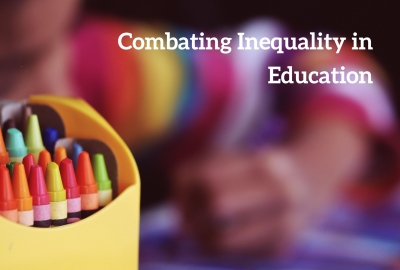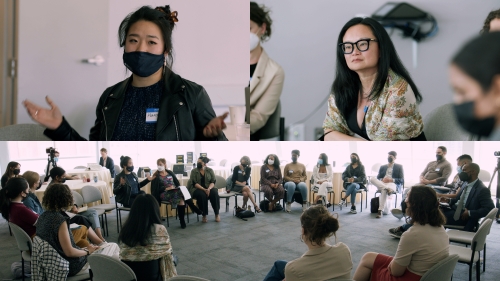
At IHDSC, an interdisciplinary approach to education and child development allows us to support children, families, teachers, and leaders, and to envision long-term solutions that inform education policy and practice in local, national, and global contexts. This newsletter looks closely at research in education, our recent conference on research-practice partnerships, and spotlights some of the incredible work from our faculty affiliates.

What’s the Latest Thinking on Research-Practice Partnerships (RPPs)?
The Useful to Whom? Imagining the Next Generation of Education Research Partnerships forum brought together thought leaders to discuss ways the field can move beyond the status quo and create space for the emergence of research-practice partnerships (RPP). The forum featured a keynote presentation and facilitated workshop by Dr. Vivian Tseng, current Senior Vice President at the William T. Grant Foundation, and incoming President & CEO of The Foundation for Child Development on ways to center young people and communities, particularly those marginalized by racism, xenophobia, homophobia, and poverty, in research-practice-community partnerships. Dr. Tseng suggested three principles for future work:
-
Understanding the historical context of racism and colonialism in universities and school districts and how contemporary manifestations of those forces affect university and school district relationships with communities.
-
Given our colonial and racialized history, the self-determination of youth and communities of color is critical so that research serves their interests in the ways they want to be served.
-
Analyses of power dynamics are critical in building meaningful, trusting, and equitable partnerships.
We'd love to hear from you! What are successful partnership strategies you've implemented? Under what conditions are partnerships successful? Share your thoughts and ideas with us by emailing ihdsc@nyu.edu or by tagging us on Twitter @nyuIHDSC.
Research as a Catalyst for RPPs: Considerations for Practice
Research-practice partnerships (RPPs) can increase access to research evidence and inform investments in policy and practice. Over the years, interest in RPPs has become more widely prioritized within academic and community-based settings. As partnerships continue to evolve in the field, we are met with the realization that RPPs are neither linear nor formulaic.
IHDSC faculty affiliates Drs. Hua-Yu Sebastian Cherng and Luis A. Rodriguez with Dr. Peter F. Halpin from the University of North Carolina Chapel Hill recently published, Teaching Bias? Relations between Teaching Quality and Classroom Demographic Composition, investigating disparities in the allocation of high-quality teachers in U.S. public school classrooms. They found that teachers demonstrated lower effectiveness scores when they instructed classrooms with more Black students, as well as Latinx students but to a lesser extent. Teachers across all racial/ethnic groups demonstrated the same patterns in teaching that disadvantage students of color. Their findings suggest variation in classroom teaching effectiveness comes from within-teacher practices and is associated with the demographic makeup of students in the classroom. The authors bring attention to deeply rooted racial inequities that continue to penetrate the educational system. They offer several considerations for practice including the need to integrate discussions about racial and cultural awareness in teacher training programs to better equip practitioners working with students from diverse backgrounds.
This work represents a different approach to RPPs. This research was not developed with a community-based partner or within a learning community, however its findings and the urgent need to respond to the issues raised by the empirical data pose interesting considerations for the initiation of one. First, the authors utilized a large data set for their analysis, raising questions about their findings’ applicability to a specific district or community context. RPPs can leverage nationally representative findings—conceivably highly generalizable findings—and strategize how to apply them to their policy and practice. In fact, it may be advantageous for RPPs to replicate such studies and their methodology to evaluate their specific community context. Second, empirical research and its findings can be the catalyst needed to begin to strategize cultural and technical changes to practice. This research surfaced wide spread inequities for students of color in classrooms and their harmful consequences. A collaborative response between practitioners, policymakers, researchers, and other key stakeholders can be the first step to transformative change. Since the publication’s release in February 2022, the authors have engaged in conversation with a collective of faculty involved with teacher training programs at NYU to discuss the paper’s findings and their alignment with ongoing reform efforts to address the absence of racial and ethnic diversity in the existing coaching and training framework.
IHDSC Projects in Education
The future of education lies in the mutual consideration of complex factors that affect education inputs and outcomes. Researchers at IHDSC collaborate across disciplines to tackle pressing issues in education that impact children, families, teachers, and communities. Explore some of the great work taking place in education research.
> CONNECT Lab
The CONNECT lab at NYU conducts research to understand and strengthen contexts for learning and mental health in low-income education settings. We study natural opportunities for academic, social, and emotional learning via productive relationships and quality interactions.
> Research Partnerships: IHDSC and Educational Alliance
Since 2014, researchers at the IHDSC and Educational Alliance have partnered to build capacity for community-based programs that support children, caretakers, and families living in poverty. Read the On the Ground post to hear how their collaboration has benefitted the communities they serve.
> Global TIES for Children
Global TIES for Children is an international research center at New York University dedicated to designing, evaluating and advising on programs and policies to improve the lives of children and youth in the most vulnerable regions across the globe.
> SMART Beginnings
The SMART Beginnings project tests a comprehensive approach to the promotion of school readiness in low-income families.
Interested in Partnering with us? Complete our partnership inquiry form
The Useful to Whom? Imagining the Next Generation of Education Research Partnerships forum was co-sponsored by the Institute of Human Development and Social Change (IHDSC), the Institute of Education Sciences-funded Predoctoral Interdisciplinary Research Training (IES-PIRT) program, the Metropolitan Center for Research on Equity and the Transformation of Schools (Metro Center), the Center for Practice and Research at the Intersection of Information, Society, and Methodology (PRIISM), and the Research Alliance for New York City Schools (RANYCS).

